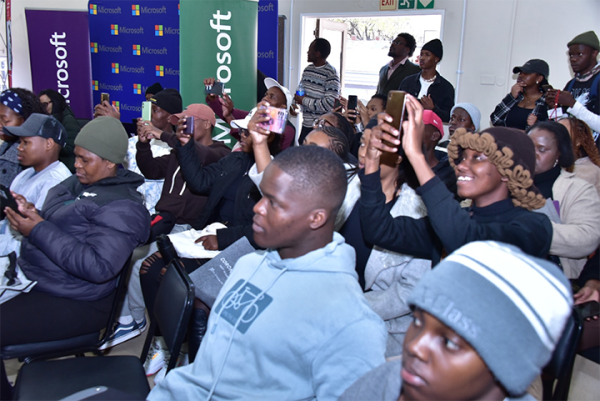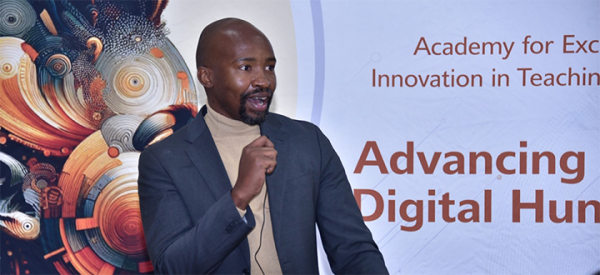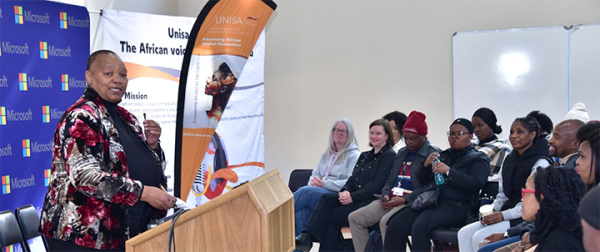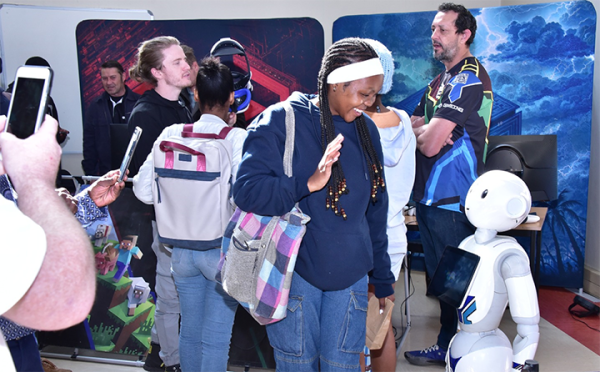
The African college of excellence in the social and human sciences
Unisa’s College of Human Sciences (CHS) recently launched of its ground-breaking Advancing African Digital Humanities (AADH) Project. Funded by the Department of Higher Education and Training’s University Capacity Development Programme for 2024-2026, the AADH Project aims to equip both staff and students with the skills and knowledge needed to excel in the field of African digital humanities.

Students attending the launch
The project, with its unique features, was officially launched on 17 July 2024 at the Sunnyside Campus, Gauteng Region. The atmosphere was buzzing with anticipation as more than 150 students gathered to learn from industry experts and thought leaders about the latest trends and advancements in the digital humanities.
The programme director, Prof Siyasanga Tyali (Director: School of Arts), emphasised the significance of this launch in positioning CHS at the forefront of technological developments, shaping the humanities globally. He also highlighted important developments that make the project essential for preparing graduates with the core digital competencies needed for employability.

The programme director, Prof Siyasanga Tyali (Director: School of Arts)
The Executive Dean of CHS, Prof Zethu Nkosi, delivered the launch address. She highlighted the challenges facing the humanities in African higher education and argued that the humanities must be reimagined in conjunction with technological advancements to maintain relevance.
Nkosi outlined five deliverables for the project, each aimed at developing competencies for a contextually relevant and responsive digital humanities programme:

The Executive Dean of CHS, Prof Zethu Nkosi, delivering the launch address
Nkosi emphasised that by providing the necessary training, resources and a supportive community, AADH aims to empower a new generation of scholars to lead in the field of digital humanities. She highlighted that this project addresses the immediate needs of the academic community and supports the long-term growth and development of African academic institutions.
Concluding her address, Nkosi stated: "Today, we have outlined a bold vision for the College of Human Sciences and the University of South Africa, set ambitious goals, and committed ourselves to the transformative potential of the Advancing African Digital Humanities Project. This initiative represents a significant leap forward for African higher education, combining our rich cultural heritage with cutting-edge digital tools and methodologies. We are determined to redefine the humanities, making them more relevant, impactful, and inclusive for the 21st century."
Microsoft, RGB Gaming and the Academic Development Open Virtual Hub showcased their exhibits at the launch. Students had the opportunity to interact with the exhibitors, experience virtual reality, artificial intelligence and generative artificial intelligence, and meet Unisa’s first semi-humanoid robot, Lwazi. Additionally, selected departments in CHS shared some of the innovative projects they plan to collaborate on with the AADH Project.

Students engaging with exhibitors
The day concluded on a high note, with some students sharing their experiences throughout the day:
Mashupye Edward Phala: "I learned a lot about artificial intelligence and the digital world, and its importance in aiding me to face the future world."
Onalenna Mathebe: "I actually learned a lot…digital humanities has expanded my understanding of the intersection of technology and humanistic inquiry, showcasing the potential for innovative research, teaching and community engagement."
Olga Neo: "I have learned about the digital humanities and how, as Africans, we need to embrace our African roots but also be able to transform to the digital space."
* Submitted by the AADH Project Team
Publish date: 2024-07-25 00:00:00.0